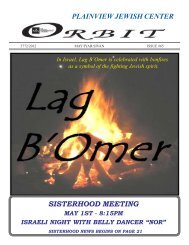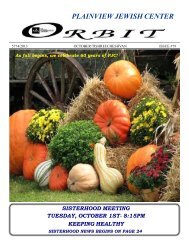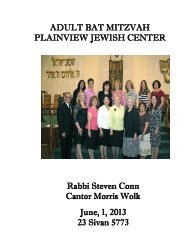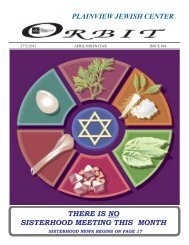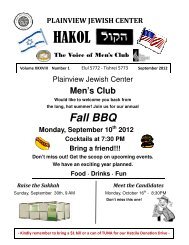Orbit February 2012 - Plainview Jewish Center
Orbit February 2012 - Plainview Jewish Center
Orbit February 2012 - Plainview Jewish Center
You also want an ePaper? Increase the reach of your titles
YUMPU automatically turns print PDFs into web optimized ePapers that Google loves.
The Cantor’s Note:<br />
ORBIT<br />
Both Sides of the Polish Coin<br />
( continued on Page 7 )<br />
Page 6<br />
I always enjoy writing about our <strong>Jewish</strong> travel experiences. It is one<br />
way to relive them. This year, we spent our mid-winter holiday in London<br />
again, so here are some tidbits of <strong>Jewish</strong> interest from “across the pond.”<br />
London is home to a <strong>Jewish</strong> chorus called the Zemel Choir. It is a<br />
venerable and distinguished ensemble which recently participated, together<br />
with seven other <strong>Jewish</strong> choruses from around the world, in the first Lewis<br />
Lewandowski Choral Festival in Berlin. The composer, Lewandowski, was<br />
a seminal figure in nineteenth century German Reform synagogue music whose influence is still felt<br />
today. What made this performance singular and moving was its venue. It was held in the Martin<br />
Luther Memorial Church, a site with Nazi associations, where no <strong>Jewish</strong> choir had ever before been<br />
invited to sing. First opened in 1935, the swastika-adorned tiles of this Protestant congregation<br />
were removed after the war, but the Imperial Eagle, a symbol of the Third Reich, is still visible. On<br />
the pulpit, a Wehrmacht soldier, a storm trooper, and a member of the Hitler Youth are depicted<br />
alongside figures from the Bible. The church organ, before its installation, had been used at the<br />
Nuremberg Nazi party rally. For the Zemel Choir, being able to sing <strong>Jewish</strong> music in this church, at<br />
the invitation of the pastor, was a triuimph over a barbaric past.<br />
London is preparing with great anticipation, excitement, and some anxiety for the <strong>2012</strong><br />
Olympics. I was pleased to learn that four, and eventually more, local rabbis will serve in the contingent<br />
of chaplains ministering to the Olympic and Paralympic athletes, and the sizable press corps<br />
expected to attend the games. Particularly encouraging, in view of the sporadic acrimony between<br />
our denominations and the traditional institutional hegemony of Orthodoxy in England, is the fair split<br />
between orthodox and progressive rabbis, with representatives of the mainstream Orthodox United<br />
Synagogue, the Reform and Liberal movements, and even the Chabad all working together. Hopefully<br />
they will yet be joined by a rabbi from the Masorti movement, England’s version of Conservative<br />
Judaism.<br />
On the subject of conviviality, I am delighted to report that London has its first licensed kosher<br />
pub. No, this term is not an oxymoron! The Castle Pub, in Golders Green, a heavily <strong>Jewish</strong> suburb,<br />
will serve kosher versions of pub staples, from an English breakfast to a Sunday roast, as well as<br />
traditional <strong>Jewish</strong> favorites such as salt (corned) beef and falafel. Although the pub will be open on<br />
Shabbat, it will serve only bar snacks, and the restaurant will be closed. All alcohol on the premises<br />
will be kosher. Certainly a place to visit next time, should it be blessed with success.<br />
On a more sober note, reading the weekly London <strong>Jewish</strong> Chronicle gave me a different and<br />
revealing perspective on the emotional issue of post-Holocaust Polish-<strong>Jewish</strong> relations. It was<br />
reported in the January 13 th edition of the American <strong>Jewish</strong> newspaper, the Forward, that there is a<br />
vanguard of younger Poles who believe that the <strong>Jewish</strong> heritage in Poland is an integral part of<br />
Polish history that Poles must learn about to understand contemporary Poland. Working through<br />
various organizations whose aims are to recapture the lost history of Polish Jewry and foster improved<br />
relations between Poles and Jews, they deploy a cadre of educators throughout Poland to make<br />
students aware of the places in their towns where Jews had lived, and where there were once<br />
synagogues and other communal institutions. One Warsaw artist recently completed a set of muralsize<br />
pictures of prominent Jews who lived in Warsaw before the war which are now displayed in the<br />
entranceway and windows of an apartment building in the former ghetto.





